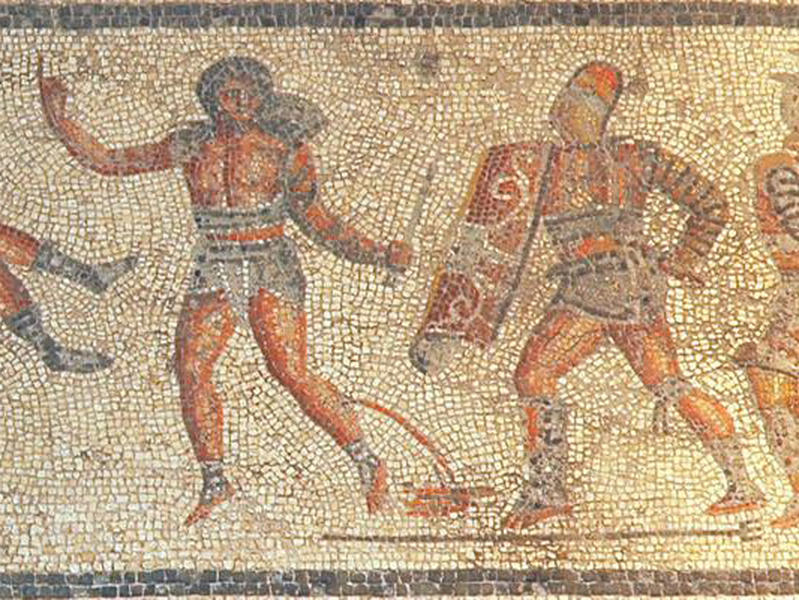Archaeologists discover 'long-lost' Roman fort


A free daily email with the biggest news stories of the day – and the best features from TheWeek.com
You are now subscribed
Your newsletter sign-up was successful
Archaeologists in Germany made a surprising discovery during an educational dig: a Roman fort that experts say has been lost for centuries.
The archaeologists found the Roman fort in the Hessian Ried in the town of Gernsheim. The fort is apparently from the late first century C.E., and roughly 500 Roman soldiers were stationed there between 70 and 120 C.E. The cohort of soldiers were part of the "Primigenia Pia Fidelis" legion, Science Daily reports, which was the "strategic backbone of the Roman frontier defense in the province of Upper Germany."
Archaeologists discovered two V-shaped ditches and the post holes from a defensive tower at the site. The researchers suspect the finds were greater than at other sites because the Roman troops filled the ditches and dismantled the fort when they abandoned it. The Gernsheim fort allowed the Romans to control large areas east of the Rhine in the late first century C.E.
The Week
Escape your echo chamber. Get the facts behind the news, plus analysis from multiple perspectives.

Sign up for The Week's Free Newsletters
From our morning news briefing to a weekly Good News Newsletter, get the best of The Week delivered directly to your inbox.
From our morning news briefing to a weekly Good News Newsletter, get the best of The Week delivered directly to your inbox.
Before the fort's discovery, historians knew little about Gernsheim during the Roman era. "Previously, the only thing that seemed certain based on the finds was that an important village-like settlement, or 'vicus,' must have been located here from the first to the third century, comparable with similar villages which have already been shown to have existed in Groß-Gerau, Dieburg, or Ladenburg," Dr. Thomas Maurer, the dig leader, told Science Daily.
Dr. Hans-Markus von Kaenel of the Goethe University Institute of Archaeology, which led the annual dig, told Science Daily that the discovery was "a bonanza" for his team of archaeologists. "We filled box after box with shards of fine, coarse, and transport ceramics; dating them will allow us to determine when the fort was abandoned with greater accuracy than was possible before," he said.
A free daily email with the biggest news stories of the day – and the best features from TheWeek.com
Meghan DeMaria is a staff writer at TheWeek.com. She has previously worked for USA Today and Marie Claire.
-
 Political cartoons for February 20
Political cartoons for February 20Cartoons Friday’s political cartoons include just the ice, winter games, and more
-
 Sepsis ‘breakthrough’: the world’s first targeted treatment?
Sepsis ‘breakthrough’: the world’s first targeted treatment?The Explainer New drug could reverse effects of sepsis, rather than trying to treat infection with antibiotics
-
 James Van Der Beek obituary: fresh-faced Dawson’s Creek star
James Van Der Beek obituary: fresh-faced Dawson’s Creek starIn The Spotlight Van Der Beek fronted one of the most successful teen dramas of the 90s – but his Dawson fame proved a double-edged sword
-
 Nobody seems surprised Wagner's Prigozhin died under suspicious circumstances
Nobody seems surprised Wagner's Prigozhin died under suspicious circumstancesSpeed Read
-
 Western mountain climbers allegedly left Pakistani porter to die on K2
Western mountain climbers allegedly left Pakistani porter to die on K2Speed Read
-
 'Circular saw blades' divide controversial Rio Grande buoys installed by Texas governor
'Circular saw blades' divide controversial Rio Grande buoys installed by Texas governorSpeed Read
-
 Los Angeles city workers stage 1-day walkout over labor conditions
Los Angeles city workers stage 1-day walkout over labor conditionsSpeed Read
-
 Mega Millions jackpot climbs to an estimated $1.55 billion
Mega Millions jackpot climbs to an estimated $1.55 billionSpeed Read
-
 Bangladesh dealing with worst dengue fever outbreak on record
Bangladesh dealing with worst dengue fever outbreak on recordSpeed Read
-
 Glacial outburst flooding in Juneau destroys homes
Glacial outburst flooding in Juneau destroys homesSpeed Read
-
 Scotland seeking 'monster hunters' to search for fabled Loch Ness creature
Scotland seeking 'monster hunters' to search for fabled Loch Ness creatureSpeed Read
